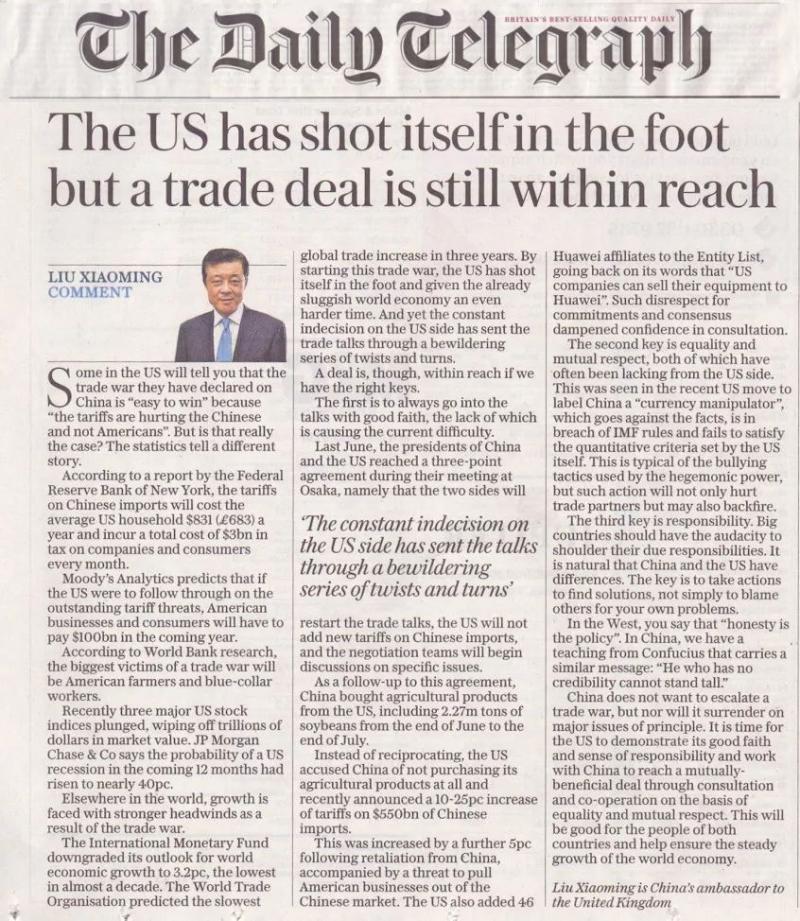2019年9月2日,英国主流大报《每日电讯报》分别以《美国自食其果,协议依然可期》、《美国加征关税害人又害己》为题,在纸质版和网络版发表刘晓明大使署名文章。全文如下:
美国一些人声称“贸易战容易赢”,认为“关税伤害的是中国,而不是美国”。但事实果真如此吗?让我们看看各种统计数据怎么说。
纽约联储报告称,对中国输美商品加征关税将导致美国每个家庭每年多支出831美元,美国企业和消费者每月支出30亿美元的额外税费。穆迪公司预测,如美国继续实施加征关税,2020年将使美国企业和消费者损失1000亿美元。世界银行研究认为,贸易战的最大受害者恰恰是美国农民和蓝领工人。近期美国三大股市显著下跌,数万亿美元市值蒸发。摩根大通预计,未来12个月美国衰退的可能性上升至近40%。同时,贸易战使世界经济遭遇更大逆风。国际货币基金组织将今年世界经济增长预期调降至3.2%,为近10年来最低。世界贸易组织预计今年全球贸易增速将降至3年来最低水平。
升级贸易战不仅“砸了美国自己的脚”,也让世界经济雪上加霜。美方反复无常,中美经贸谈判一波三折。中美如何才能解决经贸争端?我认为坚持以下三个原则至关重要:
第一,讲求诚信。当前的困难正是缺乏诚信造成的。今年6月,中美元首大阪会晤达成三点共识:双方同意重启经贸磋商,美方不再对中国产品加征新关税,两国经贸团队将就具体问题进行讨论。中国随后采购美农产品,从今年6月底至7月底,共采购227万吨美国大豆,但美方却罔顾事实,指责中国未采购美农产品。近期美方再次违背双方共识,宣布将对约5500亿美元中国输美商品加征的关税提高至10%或25%。在中方作出反制后,美方又宣布对这批中国输美商品的关税税率再提高5%,甚至声称要求美国企业撤出中国。美方还无视“允许美国公司继续向华为供货”承诺,在没有任何证据的情况下,宣布将46家华为附属公司列入实体清单。这些出尔反尔、毫无诚信的言行,严重违背了中美两国元首共识,挫伤了双方磋商信心。
第二,平等尊重。中美经贸谈判多次经历反复和挫折,根本原因在于美方缺少平等和相互尊重的态度。美方违背客观事实,无端给中国贴上“汇率操纵国”标签。这种做法不仅无视国际货币基金组织等制订的国际规则,还违反了自己制订的所谓量化标准。美方在霸权思维主导下,动辄搞极限施压、肆意采取霸凌主义的做法,害人又害己。
第三,负责担当。大国要有大国担当,也要有大国的样子。中美关系中存在矛盾和分歧不可怕,关键要有解决问题的担当。西方有句名言,“诚实为上策(Honesty is the best policy)”。中国人常说,“人无信不立”。中方不愿看到贸易战升级,但不会在重大原则问题上让步。我们希望美方展现诚信和担当,与中方共同努力,在平等和相互尊重基础上,通过磋商合作解决经贸问题,造福中美两国人民,促进世界经济稳定发展。
《每日电讯报》创办于1855年,是英国发行量最大的主流报纸,读者主要是英政府、议会、工商、文化、智库等各界人士。该报在刊登刘大使上述文章的同时,配发了照片和文字说明,指出“特朗普发动的对华贸易战使他的核心支持群体受到最严重的伤害”。
文章英文版如下:
On 2 September 2019, The Daily Telegraph carried an article by Ambassador Liu Xiaoming entitled The US has shot itself in the foot but a trade deal is still within reach. The newspaper's website published the article under the title US tariffs will inflict as much damage on America as they will on China. The full text is as follows:
Some in the US will tell you that the trade war they have declared on China is "easy to win" because "the tariffs are hurting the Chinese and not Americans". But is that really the case? The statistics tell a different story.
According to a report by the Federal Reserve Bank of New York, the tariffs on Chinese imports will cost the average US household $831 a year and incur a total cost of $3 billion in tax on companies and consumers every month. Moody's Analytics predicts that if the US were to follow through on the outstanding tariff threats, American businesses and consumers will have to pay $100 billion in the coming year. According to World Bank research, the biggest victims of a trade war will be American farmers and blue-collar workers. Recently three major US stock indices plunged, wiping off trillions of dollars in market value. JP Morgan Chase & Co says the probability of a US recession in the coming 12 months had risen to nearly 40 per cent.
Elsewhere in the world, growth is faced with stronger headwinds as a result of the trade war. The International Monetary Fund downgraded its outlook for world economic growth to 3.2 per cent, the lowest in almost a decade. The World Trade Organisation predicted the slowest global trade increase in three years.
By starting this trade war, the US has shot itself in the foot and given the already sluggish world economy an even harder time. And yet the constant indecision on the US side has sent the trade talks through a bewildering series of twists and turns. A deal is, though, within reach if we have the right keys.
The first is to always go into the talks with good faith, the lack of which is causing the current difficulty. Last June, the presidents of China and the US reached a three-point agreement during their meeting at Osaka, namely that the two sides will restart the trade talks, the US will not add new tariffs on Chinese imports, and the negotiation teams will begin discussions on specific issues. As a follow-up to this agreement, China bought agricultural products from the US, including 2.27 million tons of soybeans from the end of June to the end of July.
Instead of reciprocating, the US accused China of not purchasing its agricultural products at all and recently announced a 10-25 per cent increase of tariffs on $550 billion of Chinese imports. This was increased by a further 5 per cent following retaliation from China, accompanied by a threat to pull American businesses out of the Chinese market. The US also added 46 Huawei affiliates to the Entity List, going back on its words that "US companies can sell their equipment to Huawei". Such disrespect for commitments and consensus dampened confidence in consultation.
The second key is equality and mutual respect, both of which have often been lacking from the US side. This was seen in the recent US move to label China a "currency manipulator", which goes against the facts, is in breach of IMF rules and fails to satisfy the quantitative criteria set by the US itself. This is typical of the bullying tactics used by the hegemonic power, but such action will not only hurt trade partners but may also backfire.
The third key is responsibility. Big countries should have the audacity to shoulder their due responsibilities. It is natural that China and the US have differences. The key is to take actions to find solutions, not simply to blame others for your own problems. In the West, you say that "honesty is the policy". In China, we have a teaching from Confucius that carries a similar message: "He who has no credibility cannot stand tall."
China does not want to escalate a trade war, but nor will it surrender on major issues of principle. It is time for the US to demonstrate its good faith and sense of responsibility and work with China to reach a mutually-beneficial deal through consultation and cooperation on the basis of equality and mutual respect. This will be good for the people of both countries and help ensure the steady growth of the world economy.
编辑/周超

